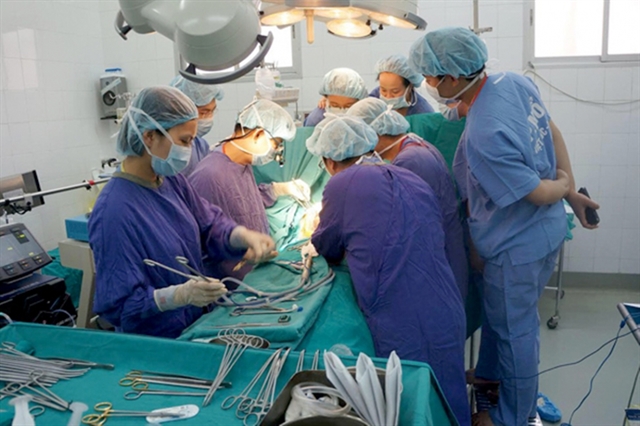
Doctors perform surgery on Phạm Công Tuấn Anh, the multi-organ donor in northern Hà Nam Province’s Đồng Hoá Commune, at the Việt Nam-Germany Hospital. Photo vtc.vn
HÀ NỘI When Phạm Văn Thụ decided to sign papers to donate the organs of his brain-dead son two weeks ago, he did not think he would have to deal with disapproval from those around him.
His family, including his wife, did not feel right about removing organs from the boy’s body. They wanted to keep him untouched.
Neighbours doubted his motivation, saying he might have sold the organs of his son or made the decision to get famous.
“I still feel pain. I was on my own with the decision. It was the toughest (decision) that I’ve made in my life,” Thụ told the online newspaper doisongplus.vn.
Thụ said the rumours didn’t matter to him now. What he hoped most was to see patients who received his son’s organs in good health.
Brave decision
Thu’s 26-year-old son, Phạm Công Tuấn Anh, from northern Hà Nam Province’s Đồng Hoá Commune, was hospitalised at Hà Nội’s Bạch Mai Hospital after suffering severe headaches in early April.
He was diagnosed with cerebrovascular malformation, a rare condition that affected the blood vessels and blood flow in the brain. One month later, he needed surgery.
The surgery did not go well. The patient was moved to Việt Nam-Germany Hospital, but there was no hope. He was declared brain-dead after three days of treatment.
Thụ said he met with some doctors to talk about organ donation. He decided to donate his son’s organ after a couple of minutes consideration.
Explaining his brave decision, Thụ said he witnessed many patients who were in critical condition and in desperate need of organ transplants to survive.
Thụ did not want his son’s death to be meaningless. With the help of the hospital, four patients were chosen to receive his donated organs.
At 6.30am on May 18, five surgeries with the participation of 130 health staff took place at the hospital. Four patients suffering from heart, kidney and liver failure underwent successful surgeries.
As planned, the hospital will conduct three more transplant surgeries for three patients in the near future.
Nguyễn Quang Nghĩa, director of the Việt Nam-Germany Hospital’s Organ Transplant Centre, said multi-organ donors such as Tuấn Anh were very rare.
Every day, there were between five and 10 brain-dead patients at the hospital, but less than one per cent of patients’ families agreed to donate their organs. Over the past ten years, there have been just 50 brain-dead cases agreeing to donate organs at the hospital.
The acts were respectable and memorable for all doctors, he said.
Nghĩa said the doctors tried their best to have more patients get transplant surgeries.
Việt Nam, as well as other Asian countries, is still prejudiced that people must be left untouched when they die. This hinders the development of organ donations. VNS